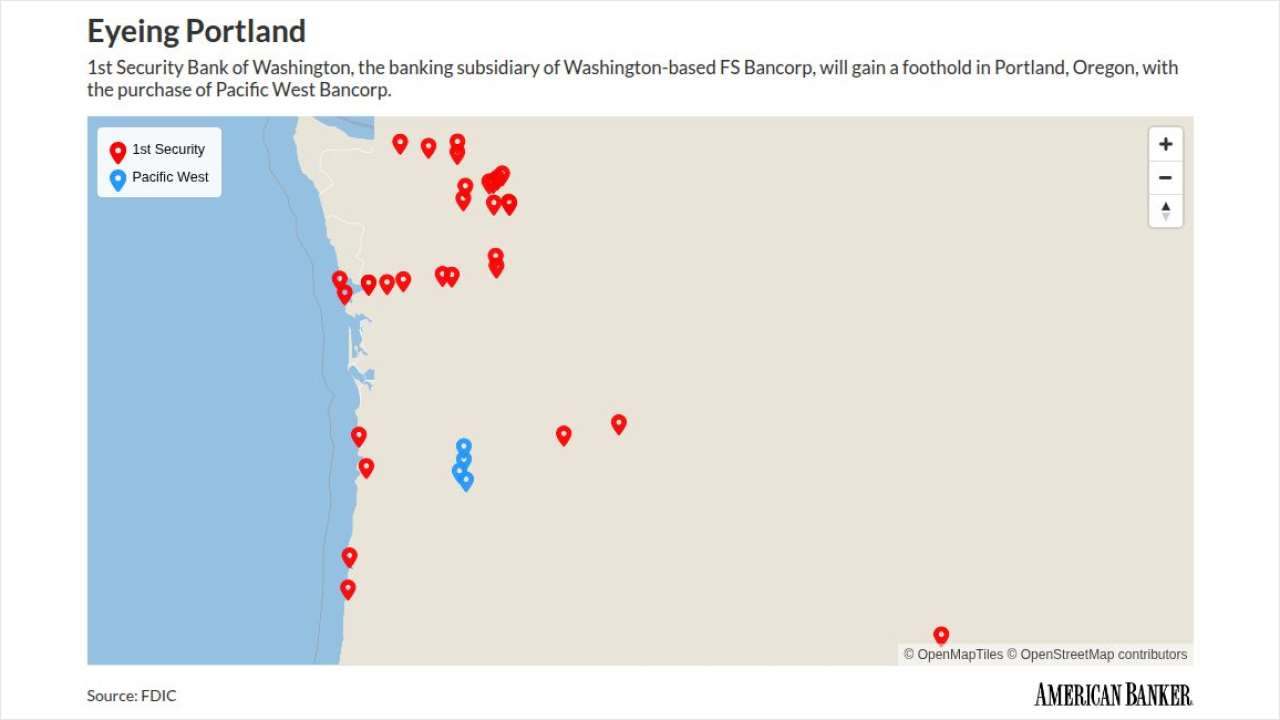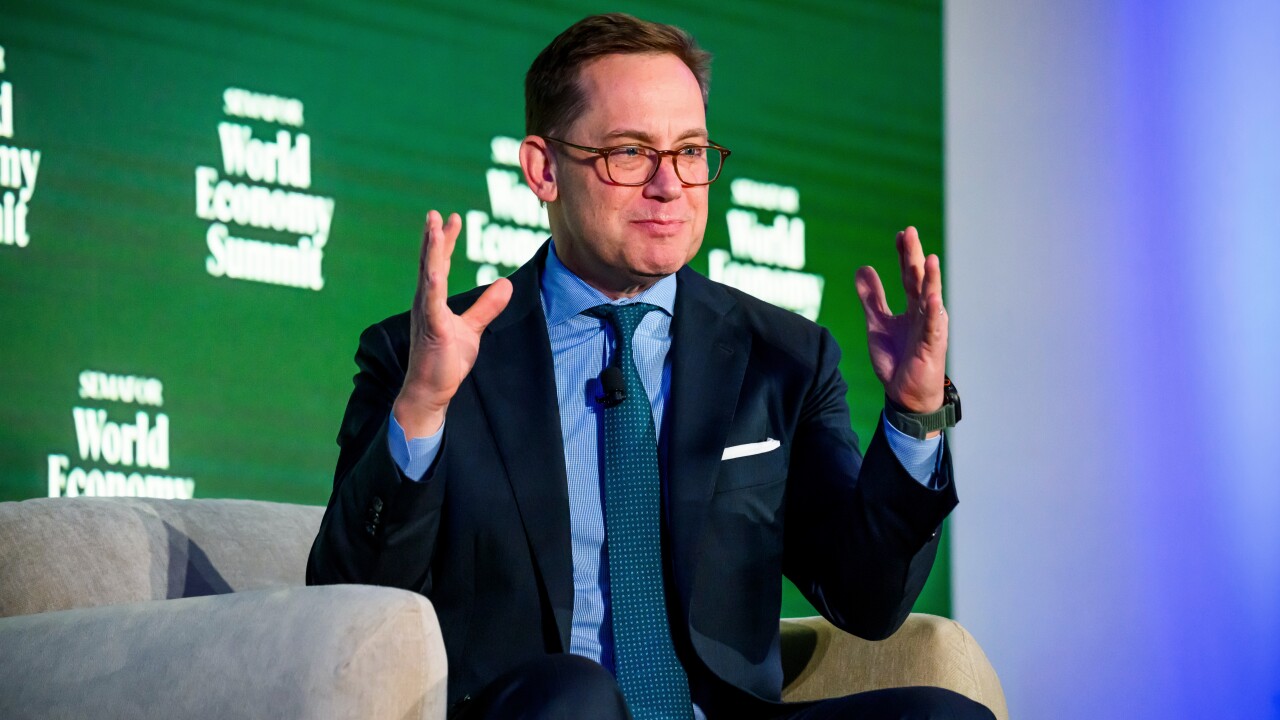After completing a much-anticipated multimedia presentation at the retail delivery systems conference in Atlanta last month, Microsoft Corp. chairman Bill Gates heard the plaintive cry of the community banker.
Processing Content
"Do you see a place for community banks?" asked Joe Edwards, president of United Bank Corp., Barnesville, Ga.
While others who stepped up to the audience microphone asked Mr. Gates about whether he would bundle the Money software with Windows, or how regulations might slow his global ambitions, Mr. Edwards worried about basic survival.
Typical of many community bankers, Mr. Edwards wondered if technology holds the key to his bank's future or the nails for its coffin.
Mr. Gates said, "Our goal is also to reach out to smaller banks (and make) our offering more turnkey for them."
Weeks later, reflecting on that encounter, Mr. Edwards was still wondering. "I would hope community bankers would at least have a chance," he said.
Some observers say community banks' smallness can work to their advantage. Not burdened by the costly infrastructures of larger banks, they can be more nimble in making the necessary systems choices - which are much cheaper than they used to be - and moving onto the information superhighway.
But money-center and superregional banks have done most of the early maneuvering. The companies that have entered into home banking alliances with Microsoft and its competitor, Intuit Inc., are all majors.
Cardinal Bancshares, the $650 million-asset, Lexington, Ky., company that operates a bank on the Internet, is an exception to the rule: Community banks have been on the outside looking in on partnerships and projects that give customers more electronic access.
Many smaller banks are no longer content to sit on the sidelines. But experts say they have their work cut out for them.
Aside from the customer acceptance and system integration issues faced by banks of all sizes, small banks still face relatively high entry costs. Meanwhile, potential technology partners have spent most of their time wooing larger institutions.
In the end, many community bankers may find it difficult to reconcile the new, high-tech delivery options with their traditional, up-close-and- personal image. Yet a growing number fear they will lose customers to rivals that use electronics to obviate the need for branches.
"The threat is that as the technology becomes easier to use, it will shatter geographic barriers," said Jeffrey Lunsford, president of Brintech Inc., a New Smyrna Beach, Fla., company that helps small banks assess new technology. "No community bank anywhere is safe."
"What is driving the small banks into this is (the loss of) customers," said Matthew Chapman, chairman and chief executive of CFI ProServices, a Portland, Ore., company that sells home banking software and other technology to small banks and credit unions. "Whether that is to a large bank or Intuit doesn't matter."
Intuit, maker of the popular Quicken software and partner to 20 major financial institutions offering services through personal computers, has been approached by smaller banks, said Viveca Ware, the director of payment systems for the Independent Bankers Association of America.
But she said financial realities put Quicken beyond IBAA members' reach: as much as $300,000 in initial programming and system integration costs, plus a required minimum of $10,000 in monthly revenue.
Mr. Edwards of $240 million-asset United Bank Corp. in Georgia said he had "talked to Intuit, but they had such a high minimum, a community bank could not participate."
"Unfortunately," Ms. Ware added, "small banks don't have the luxury of on-line play money."
Community bankers are not yet as sold as their big competitors on the concept of banking in cyberspace.
Ms. Ware estimated that 20% of community banks are actively pursuing electronic delivery alternatives, while almost as many are content with business as usual.
The remaining 60% to 70% fall somewhere in the ambiguous middle, interested but unsure.
"Many small towns in the middle of America still like the idea of interchanging with other people," said Thomas Sheehan, president of $85 million-asset Grafton (Wis.) State Bank. "They like to come into the bank."
"For a small bank, there is still a social aspect to banking," said Mr. Chapman of CFI.
Robert W. Moyer, vice chairman and chief executive of $480 million-asset Wilber National Bank, Oneonta, N.Y., said most small banks cannot afford to risk shifting the focus from branches to less conventional delivery methods.
"We can't just be a niche bank like Security First," Cardinal of Kentucky's Internet bank, he said.
But the community banks might be able to win through their flexibility, smaller scale, and lack of bureaucracy.
Mr. Sheehan said conventional size and scale issues "don't apply" in the electronic realm. Some vendors have seized on that notion to make a big play for community banks' business.
Companies like Servantis, Goldleaf Technologies, and CFI ProServices are all working the small-bank market. Visa Interactive and Checkfree Corp., among others that at first worked primarily with bigger banks, are finding opportunities in serving the small.
Even Intuit Services Corp., the processor that handles the bill payments for Intuit's and Microsoft's home banking services, is exploring alliances with regional automated teller machine networks that could provide cheaper access to small banks.
According to Mr. Chapman of CFI, community bankers are adroit enough to catch the wave.
"When they decide to go, they'll go all the way," he said, adding that community banks would eschew proprietary networks and have "Internet access from day one."
Whether or not these advances actually level the competitive playing field remains to be seen. But for now, small banks just want a fighting chance.
"I just want community banks to have equal access," said Mr. Edwards. "I'm sure it will work against us if we don't understand it."





